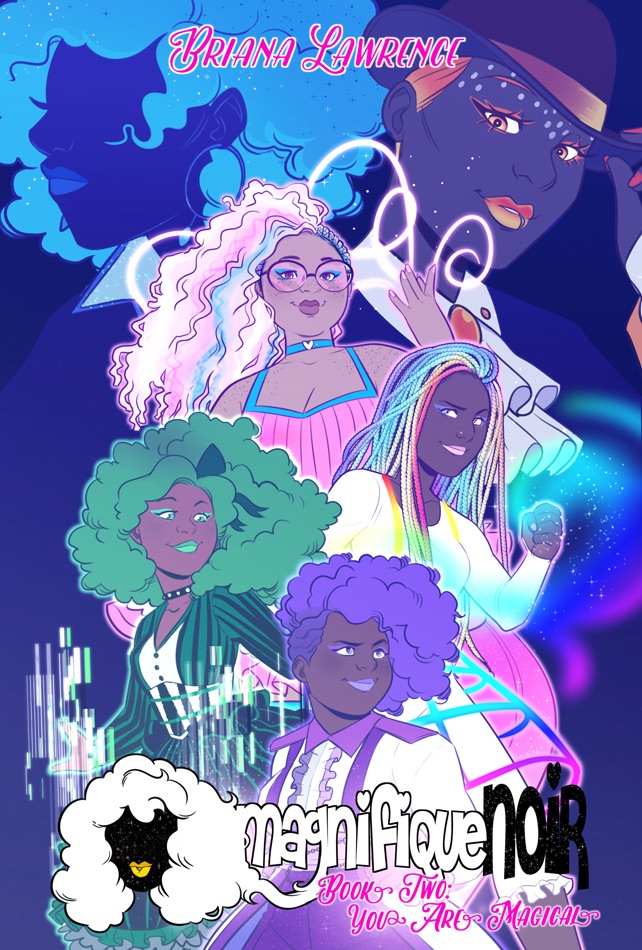“Magnifique Noir Book 2” Exemplifies the Magic of Self-Care
Created by Briana Lawrence, the illustrated novel series Magnifique Noir tells the story of Black queer young women as they come of age as young adults and as members of the magical girl team Magnifique Noir.
Book 2 of the series picks up a few weeks after the ending of Book 1. In the aftermath of a difficult battle, the new generation of the magical girl group Magnifique Noir is trying their best to move on. As they start to balance their everyday lives with their magical ones, the past comes back to haunt them in unexpected ways.
A noteworthy theme of this book is the pressure on Black women to be “the strong one.” Black women are always expected to put everyone else before themselves. Even though they are magical superheroes, the ladies of Magnifique Noir are still human. They have to learn to check in with themselves and each other. This is especially apparent in the book’s first two chapters, in which one of the girls is having nightmares about the team and their loved ones dying — a development that reflects the influence of the Japanese anime series Madoka Magica. The darkness of the situation is softened by the display of concern from her friends and her eventual decision to talk about the nightmares. Another theme, related to the insistence that Black women be strong, is the expectation for Black women to always be wholesome. Rooted in respectability politics, this expectation denies Black women agency in terms of how they present and express themselves. A later chapter comments on this theme when the ladies attend a burlesque show inspired by Magnifique Noir. Kayla, a Black female burlesque dancer, is slut shamed by a white woman for her sexually charged take on Magnifique Noir’s Cosmic Green. Even though their superhero identities are a secret, Magnifique Noir stands up for Kayla as civilians.
Another theme, related to the insistence that Black women be strong, is the expectation for Black women to always be wholesome. Rooted in respectability politics, this expectation denies Black women agency in terms of how they present and express themselves. A later chapter comments on this theme when the ladies attend a burlesque show inspired by Magnifique Noir. Kayla, a Black female burlesque dancer, is slut shamed by a white woman for her sexually charged take on Magnifique Noir’s Cosmic Green. Even though their superhero identities are a secret, Magnifique Noir stands up for Kayla as civilians.
This book shows Black women that they don’t always have to be strong or perfectly wholesome.
The decision to tackle the expectation of wholesomeness as it applies to Black women sets this book apart from other works inspired by magical girl anime. Given that the magical girl anime genre primarily features schoolchildren and was originally targeted at kids, it is rare to find books about adult magical girls doing adult things like seeing a burlesque show. Yet there are still some sparkly sweet moments could easily fit alongside classic magical girl manga like Sailor Moon.
One of my favorite moments takes the form of an illustration called “8 Bits of Rainbow” by artist Fried Unicorn Rainbow. It is a small yet dynamic and colorful piece depicting an awesome team-up between Magnifique Noir members Cosmic Green and Radical Rainbow. Another memorable illustration is “Rest Well, Magical Girls” by artist coloured_braids. It features three of the ladies in PJs sleeping together in the same bed. It is a tender moment captured well with pink pillows peaceful expressions, and the amusing contrast between the girl’s sleepwear.
In addition to illustrated moments, there is also great dialogue, scenes, and entire chapters devoted to queerness. One highlight features the character Marianna Jacobs figuring out how to define her asexual orientation with the help of Blaze, Magnifique Noir’s leader. The moments that build up to this one sensitively portray Mari’s orientation as something she is new to, but not something that she needs to change. Another notable moment is the romantic tension between Magnifique Noir’s Radical Rainbow (a lesbian) and Prism Pink (confirmed by the author to be a trans woman). Their scenes together capture the nervousness and excitement of having a crush very well.
One final bit of praise must go to the backstory about the old members of Magnifique Noir. While there are still some questions left unanswered, what is revealed is done in a way that will shock and perhaps surprise the reader. It was also great to see an older woman like Blaze growing a little closer to the girls and becoming more involved in their civilian lives as well as their magical ones. In this way, she becomes more like an auntie spending time with her nieces.
Adding a darker tone and some mature content, Magnifique Noir Book 2 continues to deliver a wonderful coming-of-age storyline with affectionate, powerful, and fun moments. This book shows Black women that they don’t always have to be strong or perfectly wholesome. No matter what you have to work through or how unwholesome you might seem, you are still magical.
—> Learn more about Magnifique Noir at the author’s website.

The Afro YA promotes black young adult authors and YA books with black characters, especially those that influence Pennington, an aspiring YA author who believes that black YA readers need diverse books, creators, and stories so that they don’t have to search for their experiences like she did.
Latonya Pennington is a poet and freelance pop culture critic. Their freelance work can also be found at PRIDE, Wear Your Voice magazine, and Black Sci-fi. As a poet, they have been published in Fiyah Lit magazine, Scribes of Nyota, and Argot magazine among others.

